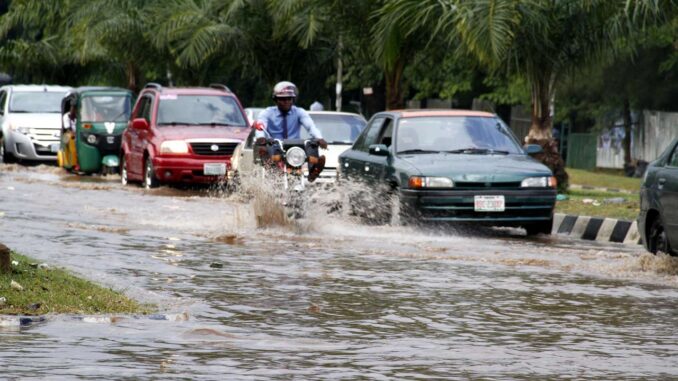
Concern that the end of August break would trigger the annual September peak rainfall underscores the repeated warnings being issued to citizens to brace up for massive floods that could spell disaster. There is need to guard against the impacts on lives and property.
The time to get ready is now that the weather is dry in several places and not when the downpour takes over. The biblical Noah built the Ark at a time when no one had seen rain. Wisdom, therefore, demands that both the government and people should heed the warnings and adjust accordingly to be on the safe side.
Interestingly, the Lagos State Government had earlier warned residents of four local government councils – Lagos Mainland, Mushin, Ibeju-Lekki and Ikorodu, especially those living on flood plains to vacate their homes immediately.
Those in fifteen other councils including Lagos Island, Alimosho, Amuwo-Odofin, Ikeja, Kosofe, Eti-Osa, Apapa, Ojo, Oshodi/Isolo, Agege, Ifako Ijaiye, Badagry, Surulere and Ajeromi-Ifelodun also got the warning issued by the Commissioner for Environment and Water Resources, Tunji Bello.
As a matter of fact, every state in the country has a responsibility to take proactive measures beforehand to avert disaster. According to the 2020 Seasonal Rainfall Prediction (SRP) released earlier in the year by the Nigerian Meteorological Agency (NiMet), the earliest cessation date for rainfall in the southern part of the country is December 28th, while September 26th is the earliest cessation date for rainfall in the northern part of the country.
In effect, the country still has many days of rainfall in the course of the wet season. More floods are expected in the months of September and October when the rivers swell and overflow their banks.
Meanwhile, the release of excess water from the dams in other countries upstream rivers Niger and Benue during September rainfall peak usually triggers more negative impacts on Nigeria, which is located downstream other countries in the Niger/Benue Basin. The floods are often aggravated by the trans-boundary inflow of rivers Niger and Benue from outside the country before they empty into the Atlantic Ocean in Nigeria.
It is on that strength that the Nigeria Hydrological Services Agency (NIHSA) also issued a red alert, advising residents of flood-prone areas to begin relocation because heavy rains will precipitate the flooding leading to destruction of property and likely loss of lives. The careless attitude of some people is their undoing.
The Director-General of NIHSA, Mr. Clement Nze, explained that 275 local government areas of the 774 would be moderately hit by the flood while 102 councils will be worse-hit. Lagos, Rivers, Delta, Edo and Kogi are on top of the list of states to witness major flooding. The others are Ogun, Ekiti, Kwara, Abia, Adamawa, Anambra, Bauchi, Bayelsa, Benue, Cross River, Ebonyi, Enugu, Gombe, Imo, Kaduna, Katsina, Kebbi, Nasarawa, Niger, Plateau, Sokoto, Yobe and Zamfara states.
Also, all the local government areas in Lagos, except Epe and many parts of Ogun State, will be badly affected, the agency added. NIHSA said governors of the states had been advised to begin immediate evacuation of residents in areas to be affected to the shelters provided for this purpose. It is senseless to wait until people are swallowed by raging floods before they would seek for evacuation. The time to do it is now.
The NIHSA DG blamed the construction of houses on flood plains for the heavy flooding experienced in some parts of Abuja recently.
According to him, some lives and property were lost at the Sunday Adewusi Estate in the Dei Dei area of the Federal Capital Territory (FCT) because it was built on a flood plain. The estate is owned by the police.
He said what was required before now across the country was proper drainage and demolition of structures on drainage channels.
Unfortunately, little or nothing is done from year to year by the various state authorities to put in place the needed flood control infrastructure, which explains why the problem is recurrent. We would like to join hands with the weather authorities in advising state and local governments, stakeholders, multinational companies and public-spirited individuals and philanthropists to join hands to save the country from the consequences of floods in the year 2020.
While residents should refrain from indiscriminate dumping of refuse into drainage channels and other unauthorized places, the authorities should establish effective refuse collection machinery as that is the only way to curb indiscriminate refuse disposal. On the whole, there should be continued civic education on the consequences of complacency in this regard.
END

Be the first to comment